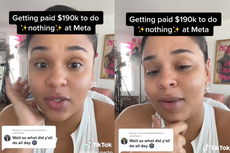I’m the Meta recruiter who was paid $190,000 for doing ‘nothing’. My Instagram Story got me fired
Maddie Machado was making $190k per year when she says she was fired by Meta for posting on social media. Now, the Florida-based recruiter makes six figures in one month, thanks to TikTok.

I started off as most recruiters do: at a staffing agency. After working as a Recruiting Program Manager at Microsoft for three and a half years, I got a great offer from Meta in September 2021. So, I took it. It was more money than I ever thought I could make in that kind of role, so it’s safe to say I was incredibly excited.
When I first started, it was a strange time in the company’s history. Two weeks before I joined, news of the Facebook whistleblower came out. We were surrounded by negative news, making reaching out to candidates incredibly challenging. Such revelations aren’t exactly attractive when trying to headhunt candidates.
Then, the company changed the name from Facebook to Meta, which happened not long after I started working as a Talent Sourcer. Then, the stock crashed. I’m sure it was a fun and happy six months prior to me getting there, but my initial time there was really, really strange.
The onboarding process was fantastic. Everything was incredibily organised and informative, something I really appreciated. I’ve worked at numerous different companies, and this was definitely the smoothest onboarding – you know, until it wasn’t.
In just one month, I was abruptly moved to another team with all new employees. Our manager was also new, so we had no idea what we were doing. In those first three months, the focus was learning the lay of the land: learning the company’s ways, all the products, how to talk to Android developers. When we were finally ready to start recruiting for talent, we realised the limited talent that was out there didn’t want to work for Facebook.
If you had asked me before I started if anybody would ever said no to working at Facebook, I would’ve said: “No, everybody wants to work there.” But apparently that was not the case.
When I was at Microsoft, I was getting paid a $135,000 annual salary and working 35 hours a week. But at Meta, there really wasn’t enough work. Finding talent took hours; our goal was to talk to three to five candidates a week, and most of us couldn’t even hit that goal.
It wasn’t that I was necessarily getting paid to “do nothing” at Meta, it just wasn’t what I had expected I would be doing at the salary I was making. I wasn’t just sitting around and not doing anything for $200,000; it was a whole team of recruiters doing nothing because of an inefficient process. I knew that when I started; they had way too many recruiters for the little talent that’s out there. How many times can you reach out to the same thousand people?
Before I was hired as a Talent Sourcer at Meta, I didn’t really have a social media following. I began posting on TikTok after seeing all these “A day in the life” videos – in which workers would visit their office where they had these really cool perks, like free breakfast and lunch.
Because I had just started at the company, I made a video talking about my benefits package. It was probably my third or fourth TikTok I had posted, and it just happened to go viral. Then, people began asking recruitment questions like, “How did you get a job there?”, “How did you get a job in Big Tech?” or “How did you get noticed?” That was how my content started, and my TikTok page grew overnight to 50,000 followers in just a few weeks.
It wasn’t until late 2021 when Meta’s legal team reached out to me. I had posted something on my Instagram Story about not realising how many people had negative ideas or feelings towards Facebook. When I met with the legal team, they pulled up my Instagram Story and I almost died. I couldn’t believe I was looking at myself on the screen.
Because Meta owns Instagram, they can see all your Instagram Stories. They can see all your direct messages. They can see everything. It should be obvious that you have no privacy when you work there. I never thought anybody would be watching my Stories, but it was definitely eye-opening. A few hours later, I quit.
I told myself: “I’m not going to work for a company where I have to worry about them watching my Instagram Stories.” If they did it one time, now I would have to worry about every time I post anything. I felt super violated and I was scared. However, my boss convinced me to take a few days to think before leaving Meta.
I scrubbed clean everything I have ever said about Meta on social media. But two months later, I received another ping on my calendar in January 2022 from the legal team. This time, it was about my viral TikTok discussing Meta’s benefits package.
After making me sit through 20 of my TikTok videos during the meeting, Meta explained that my social media posts were a “conflict of interest” because people saw me as a spokesperson for the company. I thought: “This is crazy. What can I post about? What can’t I post about?”
As soon as I got off the phone, I gave my notice. But two days later, they fired me instead.
I saw the writing on the wall, but I couldn’t believe the content that they were saying was a conflict of interest. It had nothing to do with the Meta. Still, I learned my lesson.
After leaving Meta, I started my own reverse recruiting business called Career Finesse. I was career coaching and helping people, mainly women and women of colour, to unapologetically make more money. I have a company with seven employees and I love what I do. I get to work with whoever I want and I can be myself on social media.
When I went viral last month for my TikTok about getting fired by Meta, many people assumed I lost out on $200,000 a year just to post on social media. As a recruiter, I made six figures a year whereas in January this year, I made that in a month. Yes, maybe there’s some weeks where people are telling me that I fumbled the bag, but my purpose now isn’t to make money for other companies. My purpose now is to help individuals, just like me, make more money. That is what I’m doing and that’s what I’m able to do because of my experience at Meta.
Join our commenting forum
Join thought-provoking conversations, follow other Independent readers and see their replies
Comments


Bookmark popover
Removed from bookmarks